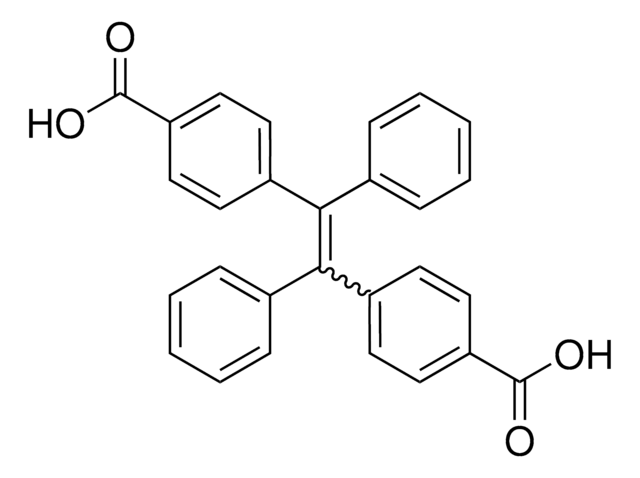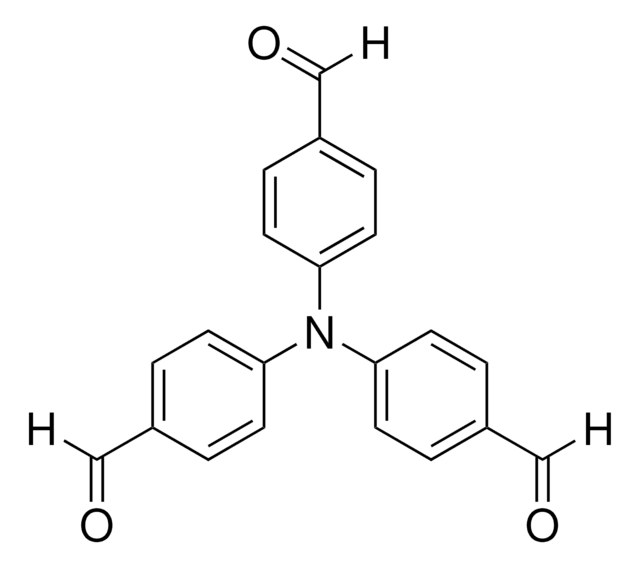791342
Silica, nanoparticle dispersion in water
<50 nm (DLS), triethoxylpropylaminosilane functionalized
Synonym(s):
NH2 functionalized NPs
Sign Into View Organizational & Contract Pricing
All Photos(1)
About This Item
UNSPSC Code:
12352302
NACRES:
NA.23
Recommended Products
form
dispersion
nanoparticles
shelf life
1 yr
concentration
in water (Dispersion)
particle size
<50 nm (DLS)
functional group
amine
storage temp.
20-25°C
Looking for similar products? Visit Product Comparison Guide
General description
Composition of nanoparticles non-crystalline colloidal SiO2 particles
Dispersion loading and medium (27 ± 3) wt.-% in water
Particle size d90 (volume distribution; DLS) < 50 nm
pH 2 ± 1
Density (1.2 ± 0.1) g/l
Primary particle size < 20 nm
Surface modification using Triethoxylpropylaminosilane
Dispersion loading and medium (27 ± 3) wt.-% in water
Particle size d90 (volume distribution; DLS) < 50 nm
pH 2 ± 1
Density (1.2 ± 0.1) g/l
Primary particle size < 20 nm
Surface modification using Triethoxylpropylaminosilane
Application
Silica nanoparticles play a crucial role in biotechnology including bone engineering and drug delivery. The amino functionality present on the surface of these materials provide a synthetic handle for further modification and conjugation to target moieties. Amino functionalized silica particles can be used for applicaitons including in vivo gene delivery, nanocomposite formation, and formation of biofilms.
Signal Word
Danger
Hazard Statements
Precautionary Statements
Hazard Classifications
Eye Dam. 1 - Skin Corr. 1B - Skin Sens. 1
Storage Class Code
8B - Non-combustible corrosive hazardous materials
WGK
WGK 2
Flash Point(F)
Not applicable
Flash Point(C)
Not applicable
Choose from one of the most recent versions:
Certificates of Analysis (COA)
Lot/Batch Number
Don't see the Right Version?
If you require a particular version, you can look up a specific certificate by the Lot or Batch number.
Already Own This Product?
Find documentation for the products that you have recently purchased in the Document Library.
Customers Also Viewed
Indrajit Roy et al.
Proceedings of the National Academy of Sciences of the United States of America, 102(2), 279-284 (2005-01-05)
This article reports a multidisciplinary approach to produce fluorescently labeled organically modified silica nanoparticles as a nonviral vector for gene delivery and biophotonics methods to optically monitor intracellular trafficking and gene transfection. Highly monodispersed, stable aqueous suspensions of organically modified
Kazuki Murai et al.
Physical chemistry chemical physics : PCCP, 15(27), 11454-11460 (2013-06-12)
We investigated the drug releasing behavior of a novel nanocarrier system, utilizing a peptide to act as a nanogate to the mesopore, on a mesoporous silica nanoparticle. The surface peptide on mesoporous silica displayed pH-dependant mesopore cap-uncap switching behavior, enabled
Dhruba J Bharali et al.
Proceedings of the National Academy of Sciences of the United States of America, 102(32), 11539-11544 (2005-07-30)
This article reports on the application of organically modified silica (ORMOSIL) nanoparticles as a nonviral vector for efficient in vivo gene delivery. Highly monodispersed, stable aqueous suspension of nanoparticles, surface-functionalized with amino groups for binding of DNA, were prepared and
Pingli He et al.
Langmuir : the ACS journal of surfaces and colloids, 20(3), 722-729 (2005-03-19)
Heme protein hemoglobin (Hb) or myoglobin (Mb) and silica nanoparticles in a variety of charge states were assembled layer-by-layer into films on solid surfaces to investigate the driving forces for film assembly. Cyclic voltammetry (CV), quartz crystal microbalance (QCM), X-ray
Preparation and characterization of epoxy composites filled with functionalized nanosilica particles obtained via sol-gel process
Kang, S..;
Polymer, 42(3), 879-887 (2000)
Our team of scientists has experience in all areas of research including Life Science, Material Science, Chemical Synthesis, Chromatography, Analytical and many others.
Contact Technical Service







